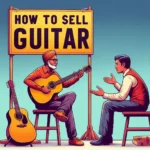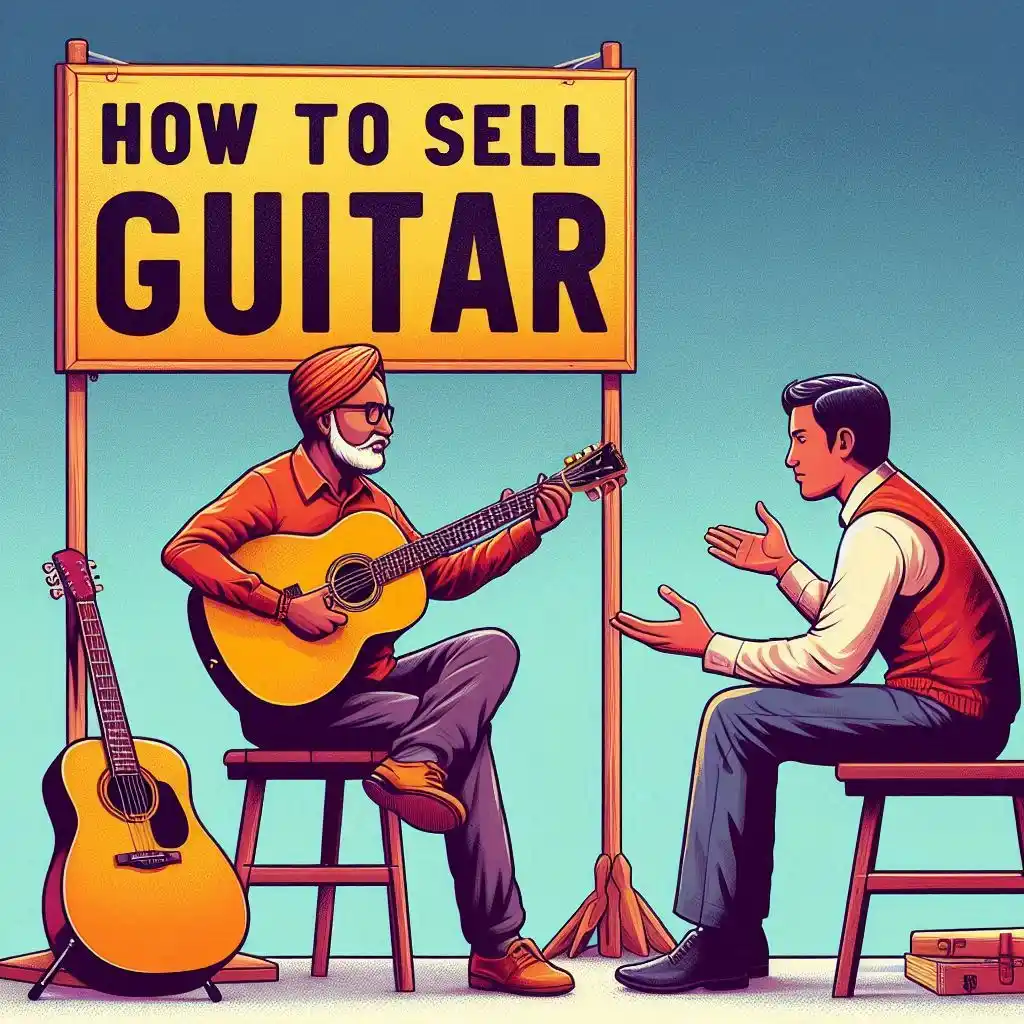
23 Tips on How to Sell Your Guitar
Alright, got an old guitar collecting dust? Or maybe you’re upgrading and need to let go of your current instrument? Whatever the reason, selling a guitar isn’t just about slapping a price on it and waiting for a buyer.
It’s an art form – kind of like playing one. So, let’s dive into the details of how to get the best buck for your beloved guitar.
1. Know Your Guitar’s Worth
Start by researching the make, model, and year of your guitar. Different brands and models have their own unique value, especially if they’re vintage or limited editions. Checking out sites like eBay or Reverb can give you a ballpark figure of your guitar’s current market value.
Did you know? A 1959 Gibson Les Paul can fetch more than a whopping $500,000! While not everyone has such a gem lying around, you’d be surprised at what some guitars can go for.
2. Appearance is Everything. Clean It Up!
Before you even think about taking pictures or showing it to a potential buyer, give your guitar a thorough cleaning. Polish the body, clean the fretboard, and if necessary, change the strings. A sparkling guitar is more appealing and will fetch a better price.
3. Snap Some Killer Pics
High-quality photos can make a huge difference. Use a good camera, and natural lighting, and take shots from various angles – close-ups of the body, the headstock, and any unique features. Remember, potential buyers will first see the guitar through these images.
4. Craft a Compelling Description
Write a detailed description. Mention the brand, model, year, any modifications, and its general condition. Was it kept in a smoke-free environment? Has it been on tour? Any cool stories attached to it? The more information, the better.
5. Be Transparent About Damages
While it’s tempting to gloss over any dings, scratches, or issues, it’s crucial to be upfront. Not only is it fair, but it also prevents potential disputes or returns.
6. Choose Your Selling Platform
There are numerous places to sell your guitar:
- Local Classifieds: Platforms like Craigslist or Facebook Marketplace can be ideal for local sales without shipping hassles.
- Specialty Websites: Websites like Reverb or Guitar Center cater specifically to musicians and can attract more serious buyers.
- Consignment Shops: Local music stores often offer consignment sales, where they’ll sell the guitar for you and take a commission.
Quick Fact: Reverb’s guitar sales increased by 50% in 2020.
7. Set a Fair Price
You want a good price for your guitar, but it should also be realistic. Consider your guitar’s condition, market demand, and urgency to sell. If you’re in no hurry, you can always start high and negotiate down.
8. Stay Safe: Meeting Potential Buyers
If selling locally, always meet in a public place, preferably during daylight hours. If possible, bring a friend. If a buyer insists on coming to your home, make sure someone else is present with you.
9. Pack it Properly
If you’re shipping the guitar, invest in proper packing. Use bubble wrap, ensure the guitar is snug in its case or box, and consider insuring the shipment.
Quick Fact: Around 1.7 million packages are stolen or go missing every day in the U.S. – insurance is worth it!
10. Communication is Key
Always be prompt and courteous when responding to potential buyers. Answer questions honestly, and be willing to negotiate if you feel it’s reasonable.
11. Accepting Payment
Cash is king for local sales. If selling online, use secure payment methods like PayPal. Avoid accepting checks or wire transfers unless you’re absolutely sure about the buyer’s credibility.
12. After the Sale: Leaving Feedback
If you sold your guitar on a platform that allows reviews or feedback, leave one for your buyer. This fosters a healthy online selling community and can also prompt the buyer to leave a positive review for you.
13. Building a Reputation
Building trust and credibility isn’t just for huge corporations. As a guitar seller, establishing a solid reputation can lead to repeated sales and even referrals. Encourage buyers to leave positive feedback, ratings, or testimonials wherever possible. Over time, this reputation can make the sales process quicker and smoother.
And, if you’re planning to sell more instruments or gear in the future, a good reputation goes a long way!
14. Keep Up with Market Trends
The value and demand for certain guitar models can fluctuate based on various factors. Maybe a particular vintage model becomes super popular because a famous artist was seen playing it. Or perhaps there’s a decline in demand for certain brands. Stay informed about market trends to time your sales for the best profit.
15. Utilize Social Media
Platforms like Instagram, TikTok, or Facebook are not just for selfies and dance challenges. Showcase your guitar, perhaps with a short video of it being played, a demo of its sound quality, or just some cool, aesthetic photos. Tag relevant hashtags to increase visibility.
16. Include Some Extras
Throw in some extra guitar picks, a strap, or maybe even a capo. These small gestures can make your offer more appealing compared to others. Plus, if a newbie is buying the guitar, they’ll appreciate the head start with essential accessories.
17. Offer a Return Policy (But Be Clear)
Consider offering a short-term return policy. This can be a strong selling point as it gives buyers confidence in their purchase. However, be crystal clear about the terms. Specify the time frame, who pays for return shipping, and in what condition the guitar should be returned.
18. Understand International Sales
If you’re open to selling internationally, be aware of additional shipping costs, customs duties, and other fees. Ensure you’re transparent with international buyers about these costs. Additionally, know the regulations: Some countries might have restrictions on importing certain woods or materials.
19. Create a Story
If your guitar has a unique history or story, share it! Maybe it was played at a memorable gig, or perhaps it was signed by a musician. Stories can create an emotional connection and can potentially add more value to your guitar.
20. Be Patient
It’s not always a quick process. Especially if you have a niche or high-priced guitar, it might take a while to find the right buyer who’s willing to pay what it’s worth. Don’t be disheartened if it doesn’t sell right away. Re-evaluate your strategy, perhaps refresh your listing photos or description, and stay the course.
21. Seek Expertise
If you’re unsure about the entire process, or if you believe you have a very valuable instrument on your hands, consider seeking expertise. There are many professionals in the music industry who can provide appraisals, advice on restoration, or even help you find potential buyers.
22. Watch Out for Scams
Unfortunately, scams are a reality in online selling. Be wary of buyers who offer more than your asking price or those who ask for personal information outside of the transaction. Use secure payment platforms and be cautious about sharing personal or financial details.
23. Stay Passionate
Selling a guitar is not just about the money. For many, guitars hold sentimental value. Communicate your passion and the love you have for the instrument. This authenticity can resonate with buyers and make them more eager to be the next custodian of your cherished instrument.

